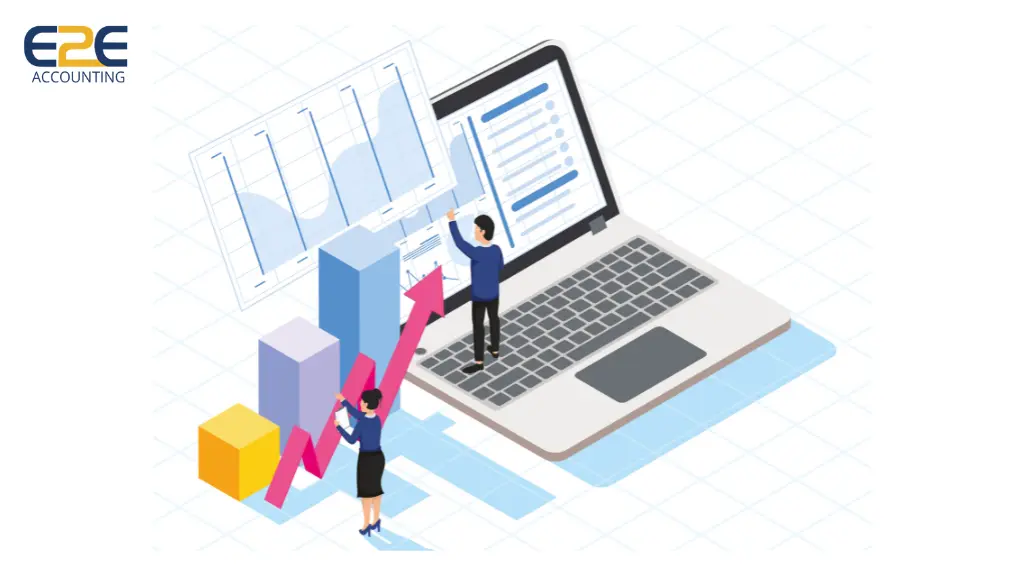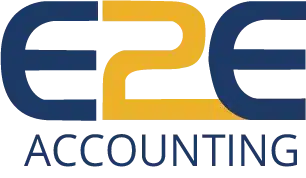SIGNUP OUR NEWSLETTER TO GET UPDATE INFORMATION, NEWS, INSIGHT OR PROMOTIONS.

The Power of eCommerce Accounting Software for Your Business Growth
Author: E2E Accounting Team
Date: February 4, 2025
Category:
eCommerce
Views: 499 views
Table of Contents
When you start an eCommerce business the first order you receive is the happiest moment of your life, isn’t it? Further, as business grows, the number of orders keeps increasing. That time, you realise you must maintain a proper accounting record of the orders received and the profit earned from them. But you have no idea of how to start with maintaining your books of accounts.
Let me tell you one thing: eCommerce accounting is not easy. There are particular difficulties because you frequently deal with many orders from several sales channels. Accurate financial recordkeeping requires an effective eCommerce accounting software system.
In this blog, we will learn about various eCommerce accounting software that are very useful for calculating eCommerce expenses and daily transactions. We will also understand apart from using accounting software whether you require eCommerce accountants too.
What is eCommerce Accounting Software?
eCommerce accounting software facilitates the management of financial records and transactions for firms. Bookkeepers and accountants use it to keep tabs on earnings and outlays, prepare invoices, control inventories, and produce financial reports.
Whether it’s bookkeeping or accounting duties, internet retailers gain repeatedly by keeping correct financial records that adhere to corporate compliance and VAT laws. In general, accounting software ensures financial stability and streamlines processes.
Common Cash Flow Challenges in eCommerce
eCommerce businesses have to manage multi-currency transactions from various parts of the world. Other than that there are various other cash flow challenges in eCommerce.
Payment Processing Delays:
Often payment processing is delayed when eCommerce businesses do not receive funds immediately after the sale due to platform or bank processing times. Payment gateways like PayPal, Stripe, or credit card processors often have hold periods ranging from a few hours to several days, impacting cash availability.
Overheads:
As your eCommerce business expands, your costs will also rise. Marketing, shipping, and warehousing costs can rise rapidly, putting a strain on cash flow and mistakes within your books of accounts.
Inventory Costs:
Stock management can be costly. Your money is invested in unsold goods if you have an excessive amount of inventory. Conversely, a lack of inventory may result in lost sales chances.
Sales seasonality:
Sales for many eCommerce companies fluctuate seasonally, for example, during holidays or other festive times. Consistent cash flow management and prediction may become challenging as a result.
How does eCommerce Accounting Software help manage Cash Flow & Finance?
Real-time tracking:
Accounting software provides you with a current picture of your finances by tracking transactions as they happen. You may make prompt judgments by keeping an eye on your income, expenses, and overall cash flow at all times.
Expense monitoring:
eCommerce Accounting software lets you keep track of all your spending, including overhead and inventory costs, so you don’t go over budget or forget to make any payments.
Automated Invoicing:
You can ensure that consumers receive their bills on time by automating the invoicing process with accounting software. This simplifies the process of managing your cash flow and lowers the likelihood of late payments.
Inventory Management:
Tracking stock levels is made possible by the integration of inventory management software with several accounting systems. Having a precise inventory management system helps you avoid spending too much money on unsold goods, which can be a big problem for eCommerce companies.
However, before selecting a tool, it’s critical to understand the basics of eCommerce accounting itself—like how to classify expenses, manage taxes across states, and improve your long-term financial strategy.
For a complete breakdown of these essentials, check out our Ultimate Guide to Accounting for Small eCommerce Business.
The Role of eCommerce Accountants & Automation
There are several eCommerce accounting software available that are best for eCommerce accounting. Still, eCommerce accountants will be needed because human expertise cannot be replaced by software. Accounting software can automate bookkeeping tasks, tax computations, and financial reporting. However, it can’t fully comprehend financial data because it simply copies the algorithms and patterns that provide good performance in predictable and expected circumstances.
The accounting software cannot handle cash flow management, tax planning, or business expansion strategies on its own; but expert ecommerce accountants can. eCommerce companies also have to deal with complicated inventory management, international taxation, and multi-channel sales. All of these tasks require expert supervision to guarantee accuracy and compliance.
Essential Role of eCommerce Accountants:
Preparing bookkeeping entries
An accountant assists you in making sense of your company’s financial records. Your initial records only show transactions, but they don’t give the full picture. Accountants organise and balance these transactions so you can see how money flows in and out of your business.
They also keep track of the exact dates and times of financial transactions. Some businesses have planned financial activities that might seem like a loss to someone without experience. Accountants not only keep your records tidy but also help you understand these situations better.
Managing Tax Matters
Tax collection and filing may be highly complicated, particularly when it comes to VAT in the eCommerce industry. If you don’t understand how the tax system operates, you’ll pay more than necessary or incur fees, that will be a loss to your business. eCommerce tax accountants make sure you stay clear of this and continue to handle taxes seamlessly and legally.
Your accountants can assist you with:
- Setting your product prices to ensure that the right sales tax is collected
- Pay taxes on time to avoid problems
- Guarantee correct and timely sales tax compliance
- Receive tax breaks
- And even look for ways to qualify for exemptions.
Collaborate with your business auditors
A common misconception among new sellers is that audits are not necessary for small firms. However, because small businesses frequently pay taxes improperly, the majority of tax collection agencies devote resources to auditing them.
In addition to helping to guarantee that your financial data is accurate, accountants can collaborate with the auditor to resolve any possible problems. Furthermore, if your audit results are favorable, you may be eligible for loans and even sponsor partners who can assist with business expansion.
Precise Forecasting and Risk Analysis
The information in your books is useful for more than your current and prior circumstances. It can also be used to predict your future earnings by your accountants. Experts in eCommerce accounting analyse the pattern created by recorded data to determine your earnings for the upcoming months.
Additionally, eCommerce trends shift quickly. You and other eCommerce retailers cannot stick to the same plan all year long since it would be hard to keep ahead of your competitors. Finding this information through forecasting is crucial for determining your next course of action and achieving the best possible outcomes.
Top eCommerce Accounting Software Providers
In 2025, there will be dozens of solutions for accounting software. New tools that streamline the business accounting process are still being offered by major companies like NetSuite and QuickBooks.
QuickBooks:
The most popular accounting program for small and medium-sized enterprises is QuickBooks. It provides cloud-based and on-premises accounting apps with capabilities including reporting, billing, due date tracking, and expense tracking.
QuickBooks includes all the capabilities you need to accurately handle your inventory, taxes, expenses, and more. Its many features are tailored to serve e-commerce firms. QuickBooks should be on your radar because it has native connectors for popular eCommerce platforms like Shopify and BigCommerce.
Wave Accounting:
Wave is an integrated accounting web-based system that is specifically made for small enterprises. Businesses can link their PayPal accounts, bank accounts, and other data sources for real-time transaction records by using the bank reconciliation tool. Reports like balance sheets, sales tax reports, and accounts receivable and payable can also be produced by businesses.
NetSuite:
Finance leaders may create, adapt, and streamline their operations and processes with the help of NetSuite cloud financials and accounting software, which is intended for large organisations.
Core accounting and finance operations are combined with robust compliance management in NetSuite. This combination lowers back-office expenses while enhancing financial closure efficiency and business effectiveness. NetSuite is worth a look if you are managing a sizable company with global operations.
SageAccounting:
Sage is a small business accounting and invoicing solution that runs on the cloud. It combines project accounting, expense management, compliance management, and core accounting into one package.
Sage handles all of the paperwork and procedures needed for business payments, including estimates, invoices, price quotations, and statements. Users can import all payment transactions immediately thanks to their connectivity with major banks. They can also keep track of their cash flow and outstanding payments thanks to the single dashboard that contains all of the information.
Xero:
Xero is an online accounting program made for startups and small enterprises. Xero gives business owners immediate access to their financial situation and links small businesses with their preferred advisors.
Any device with an active internet connection can access Xero because it is a web-based solution. Small businesses can examine their cash flows, transactions, and account details from any place thanks to Xero’s powerful accounting tools.
All bank transactions are coded and imported automatically. By keeping tabs on expenditures and future invoices, online bill pay enhances your connections with suppliers of vital business supplies.
Conclusion: Choosing the Right Software for Your Business
In your daily life, you will be dealing with an immense amount of data entering. It becomes difficult to manage all tasks manually such as adding orders, updating price and COGS data, reconciling, and so on. It can take a lot of time and result in expensive accounting errors later on. 70% of sellers have saved up to 10 hours a week on manual tasks because of real-time automation.
But your search is not just limited to choosing the right eCommerce accounting software. You also need a strong, experienced team to manage the software for your business. That’s where E2E Accounting comes in. Our expert eCommerce accountants are efficient in managing the complexities of accounting tasks as well as the software. Reach out to us with your questions or requirements, and our team will give you a prompt response.
How can eCommerce accounting software help with VAT compliance?
eCommerce accounting software simplifies VAT reporting by automatically calculating VAT on sales, tracking VAT on purchases, and generating VAT returns that are compliant with HMRC regulations.
Which accounting software is best for eCommerce businesses in the UK?
Popular options for UK eCommerce businesses include Xero, QuickBooks, and Sage. These tools offer features like multi-currency support, VAT reporting, and seamless integration with platforms like Amazon, Shopify and more.
How do I choose the right software for my online store
Consider factors such as ease of use, integrations with your sales platforms (like Shopify or Amazon), VAT capabilities, customer support, and pricing plans to choose software that fits your business needs.
How can E2E Accounting help with selecting and using eCommerce accounting software?
E2E Accounting offers expert advice and support to help you choose the right accounting software for your eCommerce business. We provide tailored solutions, ensuring seamless integration with your platforms, full VAT compliance, and streamlined financial management to optimize your eCommerce operations.

E2E Accounting Team
The E2E Accounting team combines expert accountants, legal specialists, and industry advisors to provide valuable insights into finance and compliance. With hands-on experience, we create content that informs, educates, and empowers business owners. From financial strategies to legal updates, our content serves as a reliable guide, ensuring accuracy, clarity, and a deep understanding of business challenges.
Recent Blogs
Cloud Accounting for Dentists – Making Finance and Receivables Simple
How to Relieve Pressure on Your Accounting Team Through an Accounting Outsourcing Partner
How to Start an eCommerce Business in the UK [Step-by-Step Guide]
Hospitality VAT: A UK Guide for Pubs, Restaurants, and Hotels
